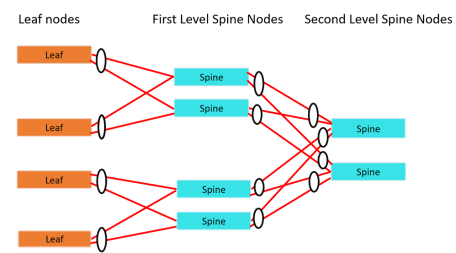Introduction to Spine to Spine and Leaf
The Spine to Spine and Leaf architecture is a multi-layer architecture used for network aggregation. This architecture supports leaf nodes and multiple levels of spine nodes. In Spine to Spine and Leaf architecture, connect the leaf and spine as follows:
1Leaf nodes to the TAPs or tools.
2First level spine nodes to the leaf nodes and the second level spine nodes.
3Second level spine nodes to all first level spine nodes.
With multiple paths between the nodes in a cluster, the spine to spine and leaf architecture protects against traffic congestion, failures, such as stack link or spine node failures. In the event of a failure, the traffic on one path fails over to the other path. This architecture provides resiliency to the network.
An example of a Spine to Spine and Leaf architecture is shown in the figure.

In a Spine-Leaf cluster, the number of leaf nodes is typically higher than the number of spine nodes. In the figure, there are four leaf nodes, four first level spine nodes, and two second level spine nodes. The leaf nodes aggregate to a fewer number of spine nodes.
For more information on Spine to Leaf architecture, refer to Multi-Path Leaf and Spine.
In the figure, the spine nodes are GigaVUE TA Series nodes, such as GigaVUE-TA100, TA40, TA10, or TA200 while the leaf nodes are GigaVUE H Series nodes, such as GigaVUE‑HC2, or GigaVUE‑HC3 which places the traffic intelligence at the edge.
Traffic between ports on the same leaf node will be local to that leaf node, but traffic between different leaf nodes will go through the spine nodes.
The traffic from a source leader in a bidirectional clock relationship (formerly master) leaf node to a destination leaf node flows as follows:
| From a TAP, traffic flows to the source leaf node. |
| From the source leaf node, traffic is load balanced to the connected spine nodes. |
| From the spine node, depending on the configuration, traffic flows to the next level of spines or the destination leaf node. |
| From the destination leaf node, traffic flows to the tool ports. |
Resiliency is achieved when there are multiple paths from the network to the tools across GigaVUE nodes.
Refer to Path Protectionfor the leaf node failure, stack link failure on a leaf node or spine node.



